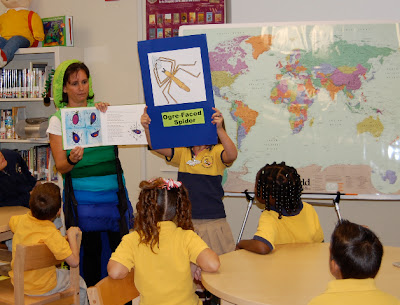Can Your Child Find Washington DC on a Map?
As a former travel writer and children’s book author, I have had the great pleasure of meeting many elementary age children in South Florida from so many backgrounds. From low and no income families to the most privileged children in private academies, the students at the schools and libraries I visit are eager to learn. Each school visit is wonderfully unique, yet one aspect remains the same.
Children are significantly lacking in basic geography knowledge.
As part of my program, children are asked to participate in a geography Q and A. I ask the students to point out destinations on a large map of the USA. The vast majority of the children, ages 7-11, are unable to answer simple questions such as, “Can you show me where Washington DC is located?” or “Where is the Atlantic Ocean?” Keep in mind these children are Floridians, and we live along the Atlantic Ocean.

A well-traveled student points out Costa Rica on the World Map
At one private school I visited, the principal told me she was embarrassed by the inability of the students to point out the capital city of Florida and name or locate any of the five Great Lakes. “Do you have a geography program here?” I asked her.
“We do starting today,” she responded.
That’s music to my ears.
It’s not just elementary age students who are struggling with geography. The problem extends through high school and beyond. The 2006 National Geographic – Roper Survey of Geographic Literacy reported that half of young Americans, ages 18-24, were unable to find NY City on a map. That statistic is so shocking that it does not even seem to be accurate. Yet sadly, it is.

1st Grade Students are Eager to Learn About the Plants and Animals of Costa Rica
What happens to young adults who cannot answer basic questions about their own state or country? What other crucial knowledge are they lacking? What does this mean for their future?
I cannot answer these questions. But I can inspire you to take your own steps to help improve this situation:
1) For starters, parents need to complain to school officials about the lack of geography education. Many schools are so busy teaching math, reading and writing to help their students pass state standardized tests that they don’t have time or resources to teach geography. Encourage schools to contact the National Council for Geographic Education for materials and program support.
2) A simple step for parents to take is to put a large map of the US or the world on a wall in their home, so kids can look at it often. Maps are so inexpensive! (I found both a world and US map set on clearance at a bookstore for $5 total!) If you mount the map on a lightweight foam board first, you can stick pins in all the places you have visited. Once the map is on the wall, you can study it with your kids, ask questions, point out unique destinations and research them in books and online. You’ll all learn together. It sure comes in handy when planning for your summer vacation!
3) Search for contests and programs that encourage geography knowledge, such as the National Geography Bee.
4) Get a subscription to a geography magazine for your children.
5) Look for books for your kids to read with travel and culture related themes.
6) Take the time to learn about the history of each place you visit with your kids, both near and far. You can even start with your own town. Search for interesting facts your kids will want to research further on their own.
7) If you have family or friends in far away places, encourage your children to write them letters and ask questions about where they live. And naturally, locate their home on the map.
8) Even if you are well-traveled yourself, there’s always something new to learn about geography. Educate yourself about places both near and far, and share your knowledge with the children around you. By continuing to learn about the world, you’ll encourage others to do the same.
The lack of geography knowledge among American students is not a new phenomenon, yet the progress to improve the situation has been slow. Just by being aware of this epidemic, you can start to make a difference today. Keep asking. Keep learning. And take a stand to make demands in geography education in our public and private schools. You can make a difference.
Debbie Glade is the Geography Awareness Editor for Wandering Educators.





















millie
Wonderful suggestions and interesting information. It's so important that we pay attention to teaching our kids the basics of geography!